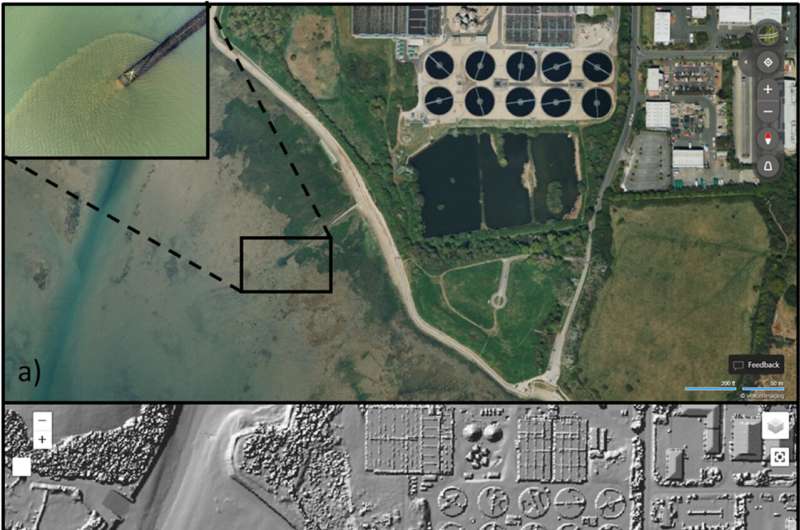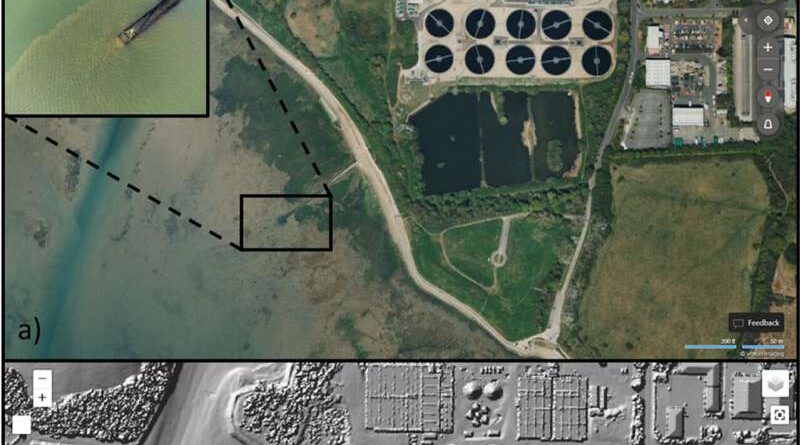Researchers call for PFAS ban after alarming findings in marine environments

a) Aerial photo of the Budds Farm wastewater treatment plant (www.bing.com/maps) with drone footage of storm water flowing into the bay (Inset photo: Chris Pearsal); b) LIDAR image of the sample area highlighting the CSO scour pool (red circle; Environmental Center ARCHI MAPS www.archiuk.com/). Credit: Chemosphere (2024). DOI: 10.1016/j.chemosphere.2024.143526
Washing your pots and pans—among many other daily tasks—can have a major impact on ocean environments over the centuries, according to a new study.
Scientists have teamed up with a UK charity to investigate the presence of hazardous chemicals in a protected area on the south coast of England.
The University of Portsmouth and the Marine Conservation Society have found that sewage is a major contributor to per- and polyfluoroalkyl substances (PFAS) in marine environments.
PFAS is a complex group of about 15,000 synthetic substances that have been used in consumer products around the world since the 1950s. They prevent food from sticking to packaging or cooking utensils, keep clothes and carpets from getting dirty, and are found in fire extinguishers.
“Permanent chemicals” – which some may see in the Hollywood movie “Dark Water” – do not break down easily in the environment. They have been linked to adverse effects on human and wildlife health.
Wastewater treatment plants (WWTPs) are not efficient at removing PFAS, so they are often released into the environment through combined sewers (CSOs).
The research focused on Langstone Harbor, a Site of Special Scientific Interest (SSSI) and a Special Area of Conservation (SAC). This area is home to seals and various types of birds.
A team from the University’s Center for Marine Science collected seawater samples before and after a sewage spill from a storm drain at the Budds Farm wastewater treatment plant, which serves people more than 400,000.
Study findings, published in Chemosphererevealed PFAS concentrations increased significantly after sewage discharge. Eight different PFAS compounds were detected after the spill, compared to only one compound detected before the spill.
Banned substances Perfluorooctane sulfonate (PFOS) and perfluorooctanoic acid (PFOA) were also found in levels exceeding the annual environmental quality standards.
Project leader, Professor Alex Ford from the School of Biological Sciences, said, “Given how much we know now about how much sewage is discharged into our rivers and oceans, it is worrying to see these levels of pollution in an area It takes decades to break down, unfortunately, so it’s no wonder these toxic compounds are found in our dolphins.
The paper raises concerns about the health of marine ecosystems and the potential impacts of industries using seafood products.
The samples also showed the amount of one PFAS called Perfluorobutanoic acid (PFBA) in the sea water was 6,000 times higher than the amount found in the surrounding water.
Professor Ford explained, “These seaweeds may act as a reservoir for these permanent chemicals around our coasts. The high concentrations of PFAS in macroalgae are can be harmful to marine life that feed on marine plants and therefore provide a trophic link on the food chain.
“Laboratory toxicity studies and human disease studies of those drinking PFAS-contaminated water have shown these chemicals can affect the immune, nervous and reproductive systems as well. and cancer and birth defects.
“It is important that we ban these chemicals as we continue to see the effects of persistent chemical pollution—such as PCBs—on wildlife that were banned decades ago, that is why it is important that we act quickly.”
Co-author Dr. Francesca Ginley, Director of Chemical Policy and Advocacy at the Water Conservation Society, said, “These findings highlight the need for urgent PFAS prevention from all processes where alternatives exist. PFAS are found in water and wildlife around the globe, from plankton to polar bears.
“These chemicals will affect us and the environment for generations to come. We need the UK Government to better protect our environment from this preventable pollution.”
More research is needed to understand the long-term effects of PFAS on marine food chains and to develop effective strategies to reduce their presence in the environment.
Previous work by Professor Ford has shown that small shrimp-like crustaceans called amphipods that feed on seaweed in Langstone Harbor have low sperm counts. Research by the University of Portsmouth has shown that long-term exposure to PFOS in amphipods can result in reduced reproduction and increased susceptibility to disease and parasites.
Additional information:
Alex T. Ford et al, Observations on PFAS contaminants before and after sewage discharges from a protected lagoon, Chemosphere (2024). DOI: 10.1016/j.chemosphere.2024.143526
Offered by the University of Portsmouth
Excerpt: Researchers call for PFAS ban after alarming findings in marine environments (2024, October 16) retrieved October 16, 2024 from https://phys.org/news/2024-10-pfas-alarming-marine-environments .html
This document is subject to copyright. Except for any legitimate activity for the purpose of private study or research, no part may be reproduced without written permission. Content is provided for informational purposes only.
#Researchers #call #PFAS #ban #alarming #findings #marine #environments
